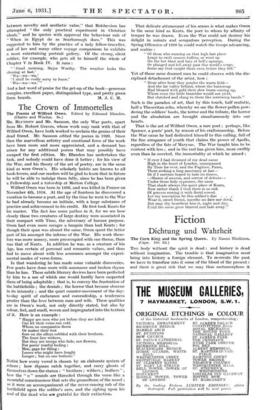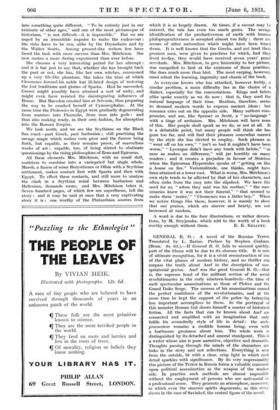Fiction
Dichtung and Wahrheit
The Corn King and the Spring Queen. By Naomi Mathison. (Cape. 10s. 6d.) THE body without the spirit is dead ; and history is dead without imagination. The trouble is that imagination must bring into history a foreign element. To re-create the past we have to transfuse into it some of the blood of the present : and there is great risk that we may thus metamorphose it
into something quite different. " To be entirely just in our estimate of other ages," said one of the most picturesque of historians, " is not difficult—it is impossible." But we are urged by an irresistible impulse to make the endeavour : the risks have to be run, alike by the Dryasdusts and by the Walter Scotts. Among present-day writers few have faced the task with more success than Mrs. Mitchison. She now makes a more daring experiment than ever before. She chooses a very interesting period for her attempt.: and it is but just to say that, whether she has brought back the past or not, she has, like her own witches, summoned up a very life-like phantom. She takes the time at which Cleomenes formed his noble but ill-fated design of restoring the lost traditions and glories of Sparta. Had he succeeded, Greece might possibly have attained a sort of unity, and might- even have resisted the disintegrating influences of Rome. But Macedon crushed him at Selvasia, thus preparing the way to be crushed herself at Cynosccphalae. At the same time the Ptolemies in Egypt were gradually degenerating from warriors into Pharaohs, 'from men into gods : and thus also making ready, in their own fashion, for absorption into the Roman Empire.
We look north, and we see the Seythians on the Black Sea coast—part Greek, part barbarian ; still practising the savage magic which makes corn grow and the furrow bring forth, but capable, as their remains prove, of marvellous works of art : capable, too, of being stirred to obstinate questionings by the rising philosophies of Zeno and Epicurus.
All these elements Mrs. Mitchison, with no small skill, contrives to combine into a variegated but single whole. Marob, a fusion of some Borysthenes or Olbia with a Scythian settlement, makes contact first with Sparta and then with Egypt. To effect these contacts, and still more to analyse the clash in a Scythian mind between barbarism and Hellenism, demands, room; and Mrs. Mitchison takes it. Seven hundred pages, of which few are superfluous, tell the story : and it may be said at once that a very captivating story it is : one worthy of the Plutarchian sources from which it is so largely drawn. At times, if a caveat may he entered, the tale has even too much gusto. The savage identification of the productiveness of earth with human philoprogenitiveness is accepted almost too fully : there are scenes of utter naturalism which might have been toned down. It is well known that the Greeks, and not least their greatest men, were -given to practices for which, had they lived to-day, they would have received seven years' penal servitude. Mrs. Mitchison, to give, historicity, to her picture, was compelled to hint at the existence of these practices. She does much- more than hint. The most carping, however, must admit the learning, ingenuity apd charin of the book.
As everyone knows who has attiti3ked, however feebly, a similar problem, a -main difficulty lies in the choice of a dialect, especially for the conversations. Kings and helots alike spoke exactly as we do now ; that is, they used the natural language of their time. Realism, therefore. seems to demand modern words to express ancient ideas : but romance cries out on the opposite side. Many authors com- promise, and use, like Spenser or Scott, a " no-language " with a tinge of archaism. Mrs. Mitchison will have none of this. Her people shall speak as we do, or not at all. It is a debatable point, but many people will think she has gone too far, and will find their pleasure somewhat marred by the style she has elected to employ. Such phrases as " went off on his own," isn't so bad it mightn't have been worse," " Lycurgus didn't have any truck with helots," " as near as makes no difference," will jar horribly on many readers : and it creates a prejudice in favour of Stoicism when the Epicurean Hypereide,s speaks of " getting on like a house on fire." Verisimilitude, one thinks, might have been attained at a lower cost. What is worse, Mrs. Mitchison's own style tends to be affected by that of her characters, and often sinks from the easy into the slipshod. We have like used for as, " whom they said was his mother," " the mer- cenaries knew it was not their funeral," " that seemed to make them realer,'" " Cleomenes was a littler boy." When we notice things like these, however, it is mainly to show that our praises, which are sincere and hearty, are not bestowed at random.
A word is due to the four illustrations, or rather decora- tions, by- M. Stryjenska, which add to the worth of a book







































 Previous page
Previous page